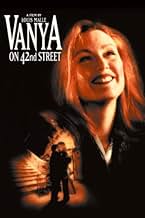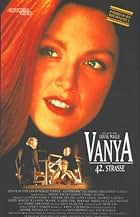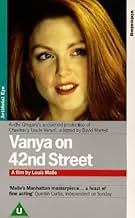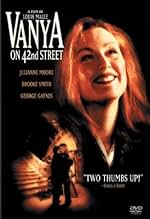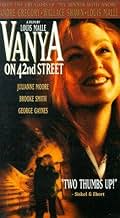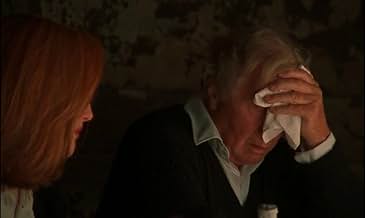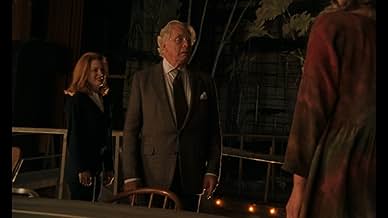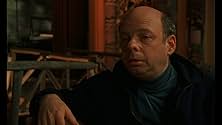IMDb RATING
7.3/10
5.5K
YOUR RATING
New York actors rehearse Chekhov's "Uncle Vanya" in a dilapidated theatre.New York actors rehearse Chekhov's "Uncle Vanya" in a dilapidated theatre.New York actors rehearse Chekhov's "Uncle Vanya" in a dilapidated theatre.
- Director
- Writers
- Stars
- Awards
- 3 wins & 13 nominations total
- Director
- Writers
- All cast & crew
- Production, box office & more at IMDbPro
Featured reviews
In New York, the cast of Anton Chekhov's "Uncle Vanya" rehearse the play in a dilapidated theater on the 42nd Street.
The arrogant and selfish Professor Serybryakov (George Gaynes) is an elderly intellectual married with his gorgeous and younger second wife Yelena (Julianne Moore) that feels trapped in a prison with her marriage. They live in a farm that supports their lifestyle with the Professor Serybryakov's brother-in-law from the first marriage Vanya (Wallace Shawn), who manages the family business with Professor's daughter from his first marriage, Sonya (Brooke Smith), a plain single young woman and Vanya's mother. The local Dr. Astrov (Larry Pine) visits the family every day since he is in love with Yelena. She talks with him about his feelings for Sonya, but Astrov misunderstands and believes she is also in love with him. One day, Sonya confides to Yelena that she has an unrequited love for Dr. Astrov. When Professor Serybryakov discloses his intention of selling the real estate, there is a crisis in the family.
"Vanya on 42nd Street" is a filmed rehearsal of Anton Chekhov's play "Uncle Vanya" by Louis Malle. The talkative story about frustrated lives, where every character wish to have a different existence, is surprisingly engaging since there are no costumes or scenarios, but excellent direction and performances. The beginning is a little boring, I agree, but give a chance to this movie and you will certainly have a great (favorable) surprise. My vote is seven,
Title (Brazil): "Tio Vanya em Nova York" ("Uncle Vanya in New York")
The arrogant and selfish Professor Serybryakov (George Gaynes) is an elderly intellectual married with his gorgeous and younger second wife Yelena (Julianne Moore) that feels trapped in a prison with her marriage. They live in a farm that supports their lifestyle with the Professor Serybryakov's brother-in-law from the first marriage Vanya (Wallace Shawn), who manages the family business with Professor's daughter from his first marriage, Sonya (Brooke Smith), a plain single young woman and Vanya's mother. The local Dr. Astrov (Larry Pine) visits the family every day since he is in love with Yelena. She talks with him about his feelings for Sonya, but Astrov misunderstands and believes she is also in love with him. One day, Sonya confides to Yelena that she has an unrequited love for Dr. Astrov. When Professor Serybryakov discloses his intention of selling the real estate, there is a crisis in the family.
"Vanya on 42nd Street" is a filmed rehearsal of Anton Chekhov's play "Uncle Vanya" by Louis Malle. The talkative story about frustrated lives, where every character wish to have a different existence, is surprisingly engaging since there are no costumes or scenarios, but excellent direction and performances. The beginning is a little boring, I agree, but give a chance to this movie and you will certainly have a great (favorable) surprise. My vote is seven,
Title (Brazil): "Tio Vanya em Nova York" ("Uncle Vanya in New York")
Chekhov's Uncle Vanya stripped down to its bare essentials when a group of New York actors rehearse in a decaying theatre with no set dressings or props but just their talent, accompanied by David Mamet's modern adaptation of the play. Off course it may be stagy but you fall under the actors spell and that's what it's all about.
There's no shortage of intelligent work in film. But here we have one of the most complexly referential things I've ever seen. Simple self-reference points to itself. Common self-reference points to the viewer defining the experience.
But Mingus used to say why have three threads when you can have seven? Here, some of the most adventurous thinkers in film give us four threads, actually four and a half.
We have the Chekhov play and the Mamet wrapping. Make no mistake that this is not an editing or a translation, but an annotation. We have two perspectives simultaneously. Add to that the notion of the play not as a play for an audience as intended, but an event conducted regularly by the performers for their own sake. This is a creation orchestrated by Gregory, the third thread. One can clearly see in some scenes neither Chekhov nor Mamet but artists collaborating in dialogs. The inner eyes and the outer eyes differ.
Fourth, we have Malle's creation which introduces us into the equation with deliberately shaky and sometimes misframed camerawork. We aren't part of any prior experience, but the actors do include the camera in their collaboration, as an independent thread. Watch how Andre works the camera.
And finally, we have the framing of the artists in real life. This is not simultaneous with the others and in any case excludes the filmmaker.
I recall seeing Paul Newman in the Color of Money in the first scene, acting on three levels simultaneously. It took my breath away. Here, the purpose of the whole contrivance is to challenge the actors (and the viewers!) to participate in a jazz ensemble of acting where the layer of reality is constantly shifting. They chose Uncle Vanya as the base for a reason, because his evershifting foci of love and hate in pairs provide cues for levelshifting.
Shawn really plays on this. His skill wasn't apparent to me on first viewing, especially in the first scenes, where all players are on stage and the non-focus actors have to be invisible. But on repeated viewings one can see his mastery, his shifting forehead! Maybe he could have been a Dostoyevsky. The two young women should be celebrated to the heavens for what they do together. I never believed so many giggles and gasps and stutters and excited silences could be so finely woven, tossed so lightly.
This is really, really good stuff, very smart. So far as an intelligent construction you won't see a superior. I never expect to see four levels at once again in film at least centered in the acting.
But Mingus used to say why have three threads when you can have seven? Here, some of the most adventurous thinkers in film give us four threads, actually four and a half.
We have the Chekhov play and the Mamet wrapping. Make no mistake that this is not an editing or a translation, but an annotation. We have two perspectives simultaneously. Add to that the notion of the play not as a play for an audience as intended, but an event conducted regularly by the performers for their own sake. This is a creation orchestrated by Gregory, the third thread. One can clearly see in some scenes neither Chekhov nor Mamet but artists collaborating in dialogs. The inner eyes and the outer eyes differ.
Fourth, we have Malle's creation which introduces us into the equation with deliberately shaky and sometimes misframed camerawork. We aren't part of any prior experience, but the actors do include the camera in their collaboration, as an independent thread. Watch how Andre works the camera.
And finally, we have the framing of the artists in real life. This is not simultaneous with the others and in any case excludes the filmmaker.
I recall seeing Paul Newman in the Color of Money in the first scene, acting on three levels simultaneously. It took my breath away. Here, the purpose of the whole contrivance is to challenge the actors (and the viewers!) to participate in a jazz ensemble of acting where the layer of reality is constantly shifting. They chose Uncle Vanya as the base for a reason, because his evershifting foci of love and hate in pairs provide cues for levelshifting.
Shawn really plays on this. His skill wasn't apparent to me on first viewing, especially in the first scenes, where all players are on stage and the non-focus actors have to be invisible. But on repeated viewings one can see his mastery, his shifting forehead! Maybe he could have been a Dostoyevsky. The two young women should be celebrated to the heavens for what they do together. I never believed so many giggles and gasps and stutters and excited silences could be so finely woven, tossed so lightly.
This is really, really good stuff, very smart. So far as an intelligent construction you won't see a superior. I never expect to see four levels at once again in film at least centered in the acting.
Other more articulate than I have said most of the positives. I rented this video because it was on a list and Louis Malle directed it. Having studied Chekov many years ago, I thought maybe this was just a campy title for a film that had nothing to do with Uncle Vanya. It turns out that it drew me back to the starkness of Chekov, forcing each character to carry a heavy burden to be engaging. I can't complain about one actor. It took me a while to accept Wallace Shawn, not as the volatile guy who has seen life pass him by and blames everyone else. To see him as a possible romantic character struck me as absurd at first, and then I saw his desperation and how he loves. He is far from a handsome man, perhaps we could say anything but handsome. And yet every time I see him I am captivated. He recently played a college professor on the sequel to the Big Bang Theory, "Young Sheldon." His confidence and the spark he exuded on that show are the opposite of his Uncle Vanya. For two hours I was captivated by this film, listening to every word, waiting for every interaction. Usually, I don't care for contrivances in film (Hamlet, for instance, set in the hippy community of 60's San Francisco), but if one has never seen Chekov, this is Chekov in all its "glory."
The idea of filming a play gets turned upside down as we see the players before and after the (rehearsal) performance, essentially as themselves. One remarkable scene shows the cast during intermission chatting with each other and audience members while munching on goodies from a caterer. It gives the experience of watching a play in an old, run-down theater, including comments from the director.
The play itself is no less remarkable. Shawn is a gifted actor, one of the few who can bring his entire body into a role. The rehearsal atmosphere takes some getting used to - it's hard to tell when real life ends and the play starts. There are no costumes, little in the way of sets, but it all works because the performances are so compelling. And Chekhov's Uncle Vanya is surprisingly relevant 100 years after it was written.
The play itself is no less remarkable. Shawn is a gifted actor, one of the few who can bring his entire body into a role. The rehearsal atmosphere takes some getting used to - it's hard to tell when real life ends and the play starts. There are no costumes, little in the way of sets, but it all works because the performances are so compelling. And Chekhov's Uncle Vanya is surprisingly relevant 100 years after it was written.
Did you know
- TriviaFinal film directed by Louis Malle.
- GoofsIn the different acts, some people change clothes, while others don't. Sonya, for instance, wears two different dresses. In a run-through people don't change clothes.
- How long is Vanya on 42nd Street?Powered by Alexa
Details
- Release date
- Countries of origin
- Languages
- Also known as
- Vanya on 42nd Street
- Filming locations
- Production companies
- See more company credits at IMDbPro
Box office
- Gross US & Canada
- $1,746,050
- Opening weekend US & Canada
- $17,636
- Oct 23, 1994
- Gross worldwide
- $1,746,050
Contribute to this page
Suggest an edit or add missing content


